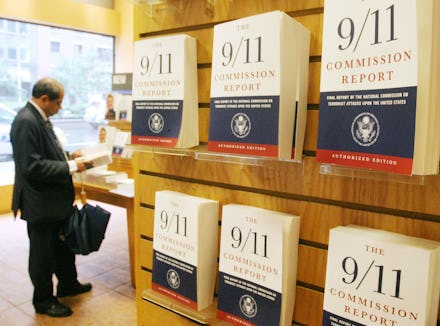The White House May Finally Declassify America's Most Damning 9/11 Report

Nearly a decade and a half since the Sept. 11, 2001, terrorist attacks, the U.S. government may finally make public the most controversial redacted government report since the Warren Commission: the results of a congressional investigation into alleged evidence of Saudi Arabian government support for al-Qaida.
The 28-page section of the 9/11 Commission Report, titled "Finding, Discussions and Narrative Regarding Certain Sensitive National Security Matters," was redacted in its entirety on alleged national security grounds by the Bush administration — and the pressure is on President Barack Obama to finally reveal its contents.
The movement to release the missing 28 pages of the report has been in place since the report's publication in 2002, with support from the families of 9/11 victims. But the pressure increased sharply last week when a deposition of Zacarias Moussaoui (a French citizen convicted of conspiring to kill American citizens as part of the 9/11 attacks) was introduced as part of a lawsuit brought against the Kingdom of Saudi Arabia by relatives of the attack's victim's.
The deposition is damning — if a little unreliable. First reported in the New York Times, the deposition reveals that Moussaoui fingered then-Saudi intelligence chief Prince Turki al-Faisal and Prince Bandar Bin Sultan, Saudi ambassador to the U.S. from 1983 to 2005, as al-Qaida financiers who plotted to bring down Air Force One with a shoulder-mounted missile.
The White House is feeling the heat. "The administration, in response to a specific congressional request, last year asked the intelligence community to conduct a classification review of that material," said White House spokesperson Joshua Earnest to reporters on Thursday.
Now congressional leaders are joining the chorus: On Wednesday, former Sen. Bob Graham, the lead author of the report, stated at a press conference that the missing pages "point a very strong finger at Saudi Arabia as the principal financier" of the hijackers.
"This may seem stale to some, but it's as current as the headlines we see today," Graham said. The former Florida senator was the chairman of the Senate Select Committee that issued the report, and he says that if the blacked-out pages never see the light of day, the terrorist financial network that supported the 9/11 hijackers will only be able to continue. Graham stated to reporters that it is "highly improbable" that the 9/11 hijackers acted without outside funding or support from a sovereign government, and he claimed that the redaction of the portion of the report addressing that connection "[protects] the government most responsible for that network of support."
The report has been described as so damning by the few elected officials who have read it that legislation has been introduced to force its declassification. Standing alongside Graham at the press conference were Rep. Walter Jones (R-N.C.) and Rep. Stephen Lynch (D-Mass.), who are co-sponsors of House Resolution 428, stating that "the president should declassify a 28-page section of the Joint Inquiry Into Intelligence Community Activities Before and After the Terrorist Attacks of September 2001, and the families of the victims and the people of the United States deserve answers about the events and circumstances surrounding the Sept. 11, 2001, attacks on the United States."
At the conference, both congressmen reminded the press that on multiple occasions, Obama has told families of the attack's victims that he himself wants the report declassified.
Even the Saudis want it declassified. The Kingdom of Saudi Arabia has long maintained that there are no connections, financial or otherwise, between the 9/11 hijackers and any member of the Saudi government or royal family. In a statement by Prince Bandar, the Saudi embassy to the U.S. declared the redaction an insult to U.S.-Saudi relations.
"The idea that the Saudi government funded, organized or even knew about September 11th is malicious and blatantly false," Prince Bandar declared. "Saudi Arabia has nothing to hide. We can deal with questions in public, but we cannot respond to blank pages."